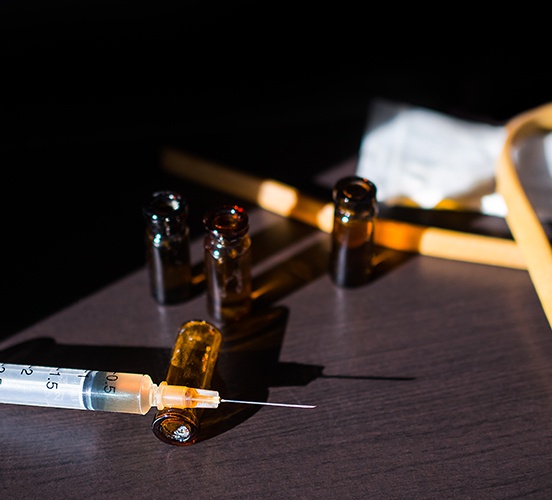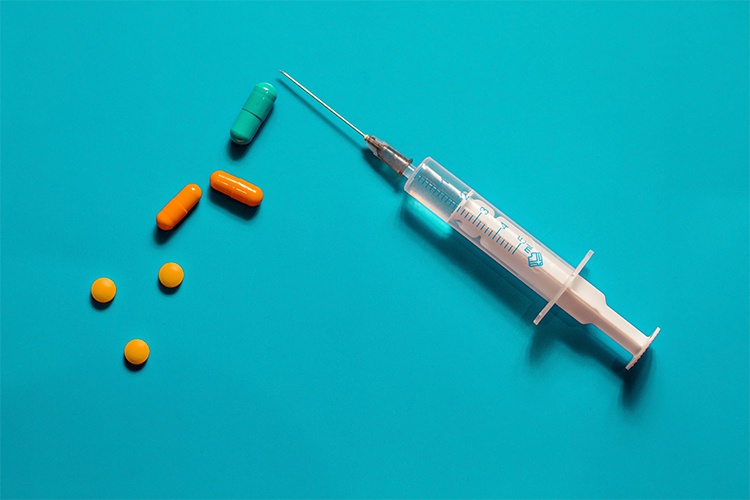If you are struggling with amphetamine addiction and are in need amphetamine rehab, 1000 Islands Addiction Treatment Centre is here to help. We offer a fully accredited amphetamine addiction recovery program to help you cease drug use and find your path to recovery.
Amphetamine Addiction Treatment and Detox in Ontario
Originally created as a treatment for nasal congestion in the 1930s, amphetamine is a powerful central nervous stimulant that can alter the user’s sense of reality, make behaviour unpredictable and violent, and have serious long-term effects to physical and mental health. Although the drug was first intended to relieve respiratory symptoms, those who used it found that it did not serve this purpose. However, they did report feelings of euphoria, and as a result, it was marketed as a treatment for “psychological tiredness”. Amphetamine use continued for several decades before the medical field determined that most medical benefits were outweighed by the risks and the potential for addiction.
CALL OUR TOLL FREE HELP LINE NOW 1-855-929-4045 or SEND US A MESSAGE
Effects Of Amphetamine
The euphoric effects of amphetamine last for a short time, which may result in the user taking ever-increasing doses to achieve the feelings of euphoria. Some factors that impact exactly how the drug affects the body and mind include:
– The age, weight and general state of health of the user
– How long the individual has been using the drug
– If there are any coexisting mental health problems
– The amount and frequency of use
– Whether the drug is used in conjunction with any other substances
– The method of ingestion
Short-Term Effects Of Amphetamine Use
– Increased or irregular heart rate and blood pressure
– Tremors and shaking
– Impaired coordination and blurred vision
– Headaches
– Fever
– Nausea and vomiting
– Dilated pupils
– Dry mouth and dehydration
– Increased libido
– Nervousness, irritability and aggression
– Talkativeness
– Alertness and high energy that may turn into restlessness
– A sense of superiority over others
Long Term Effects of Amphetamine Use
One of the things that makes amphetamine drugs particularly dangerous is that they can cause changes to the structure of the brain. This can have long-term effects on judgment, learning ability, memory and coordination. Individuals may be prone to engaging in high-risk behaviour, such as dangerous activities, gambling, and unprotected sex.


Other long-term effects of using amphetamine include:
– Visual and tactile hallucinations
– Anxiety, paranoia and confusion
– Aggressiveness and violence
– Skin sores and dental problems
– Insomnia
Risk Of Overdose
Most drugs come with a risk of overdose, but in the case of amphetamine drugs, the risk is amplified by the fact that illegal producers frequently combine the drugs with other substances, resulting in effects that can be dangerous and unpredictable. This creates a challenge not only for the addict, but for first responders and medical professionals.
Common signs of amphetamine overdose include:
– Difficulty breathing
– Racing heart rate, stroke or cardiac arrest
– Fever or chills
– Seizures or convulsions
Any individual displaying these symptoms should be taken to the nearest emergency room as soon as possible.

Why Is Amphetamine Addictive?
Amphetamine drugs are among the most abused of all prescription medications. They are designed to boost energy and concentration, which is what makes them a good candidate to treat ADHD and narcolepsy. The drug works by activating neurotransmitters in the brain, such as dopamine. These neurotransmitters are responsible for the feelings of euphoria we experience through time spent with friends, a good workout, or an enjoyable activity.
Naturally induced euphoria is longer-lasting, and the elevated dopamine levels subside over a period of time. Euphoria generated from drugs like amphetamine tends to be short-lived, and instead of gradually subsiding, the dopamine levels crash. This can result in a sense of desperation, and an intense craving to get more of the drug in order to recreate the high. The problem is that the next time amphetamine is used, a higher dose is needed to accomplish the same effect.
To add to the danger, amphetamine is often produced illegally in labs that do not follow any safety standards or protocols. Moreover, the drugs produced may be combined with other substances, meaning that unpredictable effects may occur and overdoses may be difficult to treat.
Amphetamine Addiction Treatment Types
It is never too late to seek help for amphetamine addiction. Our facility, located in a beautiful setting far from the stresses of life, will provide you with a safe, caring environment in which to heal and start the journey toward a happier life.
As a full service inpatient drug rehab facility in Toronto, we can hold your hand through all phases of your recovery.
Inpatient Treatment
Inpatient treatment programs typically involve staying at rehab facilities for at least a month or longer, allowing the patient to focus entirely on recovery without the regular habits and stressed of daily life.
Depending on the inpatient facility, clients can benefit from one-on-one and group therapy, accommodations and housekeeping, chef prepared meals, amenities, and a community of peers in recovery.
All of these components come together to strengthen the healing process, and contribute to a client’s holistic wellbeing. While not required to recovery from amphetamine addiction, these components contribute to success and can be the difference for certain individuals.
Outpatient Treatment
While the inpatient treatment process may be required for some people to overcome their substance use disorder, others, especially with less intense addiction issues, may be able to overcome it with outpatient treatment.
Outpatient rehab does not involve staying overnight, but rather participating in group or individual therapy a few times a week depending on the program. This can be greatly beneficial for people who can’t afford to be away from their regular routines and responsibilities, however, it might not be a drastic enough change to form new habits.
Group Sessions
Clients can greatly benefit from participating in group sessions. It’s a chance to interact with peers, learn from and support each other, and open up about the challenges you’ve experienced. In group sessions, you’ll learn various coping skills and tools to help you with relapse prevention plan.
Individual Counselling
Connecting with a therapist or recovery counsellor in a one-on-one setting provides the opportunity to deep dive into better understanding yourself, your motivations and stresses, and the factors contributing to your substance use. Often, there are co-occurring mental health disorders and/or contributing factors exacerbating the struggle with addiction. Individual counselling sessions can be invaluable in uncovering and addressing these issues, utilizing methods such as cognitive behavioural therapy.

Frequently Asked Questions
What is amphetamine addiction treatment?
Addiction treatment for amphetamine is a process by which a person can gradually learn to overcome urges, triggers, amphetamine withdrawal symptoms, and emotional challenges and develop new coping methods to avoid and cease amphetamine use. While challenging to overcome addiction, it can be achieved with the right mindset and supports.
How does rehab for amphetamine addiction work?
Just like with other substances, amphetamine addiction can be managed through individual and group counselling, therapy, and alumni meetings for continued support. While addiction is never cured, sobriety can be achieved and maintained with ongoing effort.
Rehab for substances can also include medical detox to overcome physical symptoms and other uncomfortable symptoms of withdrawal, enter recovery with a clear head.
How long does rehab for amphetamine addiction take?
While the length of time to overcome the struggle with substance use disorder can vary widely from person to person depending on their use history and condition of health, our inpatient treatment programs last for 42+ days. We offer extensions when necessary, and support through aftercare is required post-graduation to stay the course.
The detox component of treatment can also vary depending on the severity of withdrawal symptoms.
When it comes to outpatient treatment options, there are many more variables at play which can impact success and time in treatment, as the individual is left more to their own devices and is less isolated from distractions, triggers and stresses.
Can amphetamine addiction be cured?
No matter which kind of treatment is chosen, addiction is never considered to be cured. Sobriety can be achieved and only maintained with ongoing, deliberate effort.
How can one find a reputable amphetamine addiction treatment centre?
The Commission on Accreditation of Rehabilitation Facilities (CARF) is an international, non-profit organization mandated to acknowledge treatment providers who meet and maintain international standards of service and care within their rehab program. Patients who choose a treatment facility with CARF accreditation can be assured that their care provider is using evidence based methods with a high standard of quality and ethics.
Word of mouth from people who have attended and experienced the program is another great way to learn about what to expect, however not all programs are suitable for each person and what works for others may not be the ideal setting for you.

